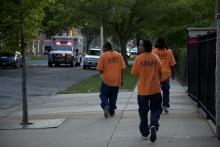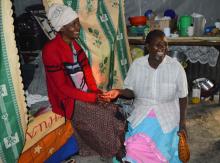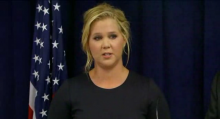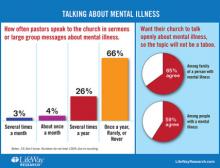mental health

"Imagine your family ripped apart. That’s going to have reverberations across family members for years to come."

Pennsylvania was the first state to institute the practice of confining prisoners alone in single cells. It started when a jail in Philadelphia became Eastern State Penitentiary, the country’s first state prison, in 1790. That was one year before the Eighth Amendment prohibited cruel and unusual punishment, and 223 years before the DOJ found the state’s use of solitary violated that amendment.

IN A GIVEN YEAR, about one in five U.S. adults will experience mental illness of some kind. And though mental illness does not discriminate, African-American adults are more likely to experience serious mental health problems, but less likely to seek treatment, than white folks, due in part to the lasting effects of slavery, segregation, and other forms of race-based exclusion—effects that translate into socioeconomic factors such as poverty, homelessness, and substance abuse which are, in turn, risk factors for mental illness.
According to the National Alliance on Mental Illness (NAMI), the factors that keep African Americans from receiving mental health services include a lack of health insurance, a distrust of the medical community, and conscious or unconscious bias among practitioners resulting in misdiagnoses. But NAMI also named another barrier to African-American mental health: the church. While one’s “spiritual leaders and faith community can provide support and reduce isolation,” explained NAMI, the church can also “be a source of distress and stigma.” The report noted that even when medical care is necessary, African Americans turn to their families, communities, and churches rather than turning to health-care professionals.
None of this comes as a surprise to Monica Coleman, a professor of constructive theology and African-American religions at Claremont School of Theology in Southern California. Throughout her new memoir, Bipolar Faith: A Black Woman’s Journey with Depression and Faith, Coleman navigates the challenges of race, gender, and the church as she heals from rape (committed by her then-boyfriend in seminary) and wrestles with a faith that ebbs and flows like the cycles of severe depression that began as she entered adulthood.
Sojourners assistant editor Betsy Shirley spoke with Coleman about mental health, social justice, and how the church might become a place that more fully fosters both.

LAST SUMMER, THE FUTURE of for-profit prisons seemed bleak. The U.S. Department of Justice announced it would begin phasing out its use of privately run prisons and the U.S. Department of Homeland Security quickly followed suit, declaring that it would reconsider its use of privately run detention centers. Stocks for companies that ran for-profit prisons plunged.
But then Donald Trump was elected president, and private prison stocks immediately soared. The nation’s largest prison company, CoreCivic (formerly Corrections Corporation of America), reported a boost of more than 40 percent in the value of its shares. Given Trump’s promises to “create a new special deportation task force,” investors bet that privately run detention centers will play a key role.
And the investors may be right. Every year, DHS detains about 400,000 undocumented immigrants in 250 centers nationwide, and 62 percent of the beds in these centers are operated by for-profit corporations.
According to Maria-José Soerens, a licensed mental-health counselor serving undocumented immigrants in Seattle, there are two major problems with for-profit detention centers. First, for-profit centers are not held accountable to the standards that govern federally run centers. In her work in these centers, Soerens has heard complaints ranging from a lack of medical attention to inadequate opportunities for parent-child visitation; one young woman who was having suicidal thoughts was kept in solitary confinement until she told guards she was “better.”
But the deepest problem, explains Soerens, is that most detention centers only exist because corporations saw a “business opportunity.” Beginning in the early 2000s, for-profit prison companies successfully lobbied Congress to expand drastically the number of beds in the immigration detention system—a move that doubled the revenue of the two largest for-profit prison companies. In 1998, there were 14,000 beds available for immigrant detention; today, there are 34,000.

For some, joy comes in the morning after a passing night. Others might require special, prolonged attention and a slew of various helps to cope through a night that lasts years, that seems to hijack all of life — and this is not just true of the chronically ill, but many who might be bound by trauma or unbearable grief.

Between 50 and 70 percent of the young prisoners in state juvenile justice systems have a mental disability, but an analysis of those systems found that only one state — Indiana — requires all teachers in such facilities to have special education certification.

A recent tweet sent out by Dr. John Piper’s Desiring God ministries team sure sounded like an attack upon counseling and psychology.
On Feb. 6, Desiring God tweeted, “ We will find mental health when we stop staring at the mirror and fix our eyes on the strength and beauty of God.”
1. I Wanted to Do a Good Deed. I Talked Myself Out of It Because I Thought of All the Ways I Might Get Killed
“I almost pulled up to the house right then, but I decided to drop off my daughter first. Should something go awry, I do not want my daughter there.
Should something go awry.”
2. How to Survive a Bomb Cyclone
A very practical how-to for those of us on the East Coast.

Cure Violence is working to “treat” gang membership with a strategic approach that taps into the cycle of violence. They train people in heavily affected communities to detect catalyzing events that lead to joining a gang. The intent is to interrupt individuals’ behaviors before they commit crimes, and continue communicating with them to decrease the likelihood that they and their friends will become involved in gang violence.

My depression is frustratingly, deeply, a part of me. My brain chemistry is wired in such a way that I struggle, through no fault of my own. But I do not struggle alone. As a Christian leader, this is my fervent hope and prayer.

To adults new to Christian practices of fasting during Lent, the idea can seem facetious — some sort of trendy way of worshipping both Jesus and our own well-defined abs. But for many, fasting has been a way of cleansing not the body but the mind. Temporary self-denial can invite us to compassion for those who are hungry not by choice, to a remembrance of the trials of Jesus, or to better appreciation of food when we do eat. But in the face of a world that already pressures many into self-denial, self-deprivation, and self-harm, the strength of the spiritual discipline of fasting cracks.

Those in leadership are tasked with navigating the complexities of yet another shooting investigation of an unarmed African-American man with justice and integrity. The mothers, sisters, brothers, and fathers in the community are tasked with lamenting the loss of their loved one who was crying for help, not death. It is in the midst of all this that the church must show up. If we are not an instrument of peace now, then when? Should we run into isolation? Should we cast judgment from afar? Should we shout the party line? No, we must lean in. We must listen. We must lament. We must leverage our influence for the flourishing of others.

Across Africa, many people believe mental illness is caused by curses, witchcraft, or demons. In such places, traditional medicine has long remained the first line of treatment. But a novel program in Eastern Kenya is working to change those perceptions and help the mentally ill receive better care.

Rev. J. Barrett Lee is pastor of North Presbyterian Church in Kalamazoo, Mich., whose mission is to "practice our ministry alongside people who live with mental illness." Website: wearenorth.org
1. Why is it important to talk about mental illness? The only time people want to talk about mental illness as a broad social issue is when a mass shooting occurs. It’s a huge problem because it perpetuates the myths of what mental illness is and how people with mental illness operate. People think, “What if some mentally ill person gets a gun and is going to shoot up a church or a school?” But the reality is that people who live with mental illness are actually 10 times more likely to be victims of violence than perpetrators of violence. I don’t know a single person in my church who even owns a gun.
2. How is North Presbyterian’s call to ministry unique? We decided that our ministry with people living with mental illness was not going to be a side project. It wasn’t going to be something we did in addition to our ministry. We felt God calling us to reorient the entire life of our congregation around making a space where all people can be treated as equal partners in Christ’s service. We started the Togetherness Group, a weekly social activities group where the whole goal is to be together. We do lots of fun activities, whether that’s going out to lunch, going to the zoo, or just playing bingo on a rainy day. For a lot of folks, this is their one safe space each week when they can get out of the house, be treated like a human, embrace their own humanity, have a good time, and take some of the pressure off of daily living.

BASEBALL USED to be our national pastime. But now professional football is America’s game. And why not? It’s a violent, capital-intensive spectacle carried on with reckless disregard for human health and safety. Kind of like our foreign policy, or our criminal justice system.
Last fall, 45 of the 50 most-watched TV shows were National Football League games. It is the most profitable of the major sports. The average NFL franchise brings in $286 million per year, compared to $237 million for Major League Baseball—despite baseball’s 162-game regular season vs. football’s 16.
This year the TV audiences for football are expected to grow, and NFL total revenue is expected to top $12 billion. Nothing seems to put a dent in the U.S. enthusiasm for the game. Some coaches have offered cash rewards for the injury of opposing players. Multiple players face charges for violent crimes. The Patriots cheat in the playoffs. And the game just gets more popular.
Maybe that will change this Christmas when the movie Concussion, featuring Will Smith and Alec Baldwin, is scheduled to be released by Sony Pictures. Concussion tells the story of Dr. Bennet Omalu, the Pittsburgh forensic pathologist who discovered the decisive link between repeated minor head trauma—such as from huge men crashing into each other dozens of times a day—and the bewildering array of mental illnesses that afflicts many NFL retirees.

We’d really like to have an explanation that makes these killers “other” than the rest of us. So we say they are mentally ill and demand our society do a better job caring for them.
While it’s true that we need to do a better job caring for the mentally ill, the vast majority of people with mental illness will never harm anyone. Mass murderers don’t tend to be mentally ill.

From The Hill:
The … actress was on on-hand Monday as the third-ranking Senate Democrat unveiled a three-part plan aimed at making it more difficult for violent criminals and the mentally ill to obtain guns.
“Preventing dangerous people from getting guns is very possible. We have commonsense solutions,” Amy Schumer said, supporting the senator’s push to tighten gun control laws by toughening background checks and providing additional funding for mental health treatment.

In ‘Island of Warriors,’ the second episode of the new PBS series America by the Numbers, Maria Hinojosa, executive producer and anchor of NPR’s Latino USA, examines the challenges faced by American veterans in Guam. While Guamanian residents serve in the military at three times the rate of the rest of the United States and territories, they receive the lowest per capita medical spending from the U.S. Department of Veteran Affairs. This discrepancy in resources translates to only two full-time psychiatrists for an island of as many as 16,000 veterans — 3,000 of whom are actively requesting VA medical support for psychological disorders like PTSD.
How could this be possible?
Like Puerto Rico, Guam is a U.S. territory. While residents of these territories can, and do, enlist in the American military, they cannot vote for the president who sends them into battle. Similarly, they are represented on the floor of the House of Representatives only by delegates, who have no voting power. Eddie Calvo, the Republican governor of Guam, spoke truthfully when he ventured to call Guam a “colony” of the United States.
This disenfranchised status means that residents of U.S. territories like Guam have no real standing in American democracy. They must rely on others to advocate for them. When every state could use more resources to take care of the nearly 20 percent of veterans returning from Iraq with PTSD, who’s going to stand up for Guam?
As far as geopolitical power, Guam truly is the “least of these” in American democracy. While many Americans deplore Puerto Rico’s secondary status in American political discourse, Hinojosa recalled one Guamanian saying, “We just wish we were Puerto Rico. At least then people would know where we are.”
Think about it: Do you know where Guam is? I didn’t.

Protestant clergy rarely preach about mental illness to their congregations and only one quarter of congregations have a plan in place to assist members who have a mental health crisis, a new LifeWay Research survey found.
The findings, in a nation where one in four Americans have suffered with mental illness, demonstrate a need for greater communication, said Ed Stetzer, executive director of the evangelical research firm, a ministry of LifeWay Christian Resources, which is an agency of the Southern Baptist Convention.
When it comes to mental illness, researchers found:
- 66 percent mention it rarely, once a year, or never
- 26 percent speak about it several times a year
- 4 percent mention it about once a month
- 3 percent talk about it several times a month.
“When we look at what we know statistically — the prevalence of mental illness and the lack of preaching on the subject — I think that’s a disconnect,” said Stetzer.

When I began a Masters of Divinity program at Wesley Theological Seminary, I was convinced that my generalized anxiety would be a wrinkle I’d iron out as I became more competent in preaching and pastoral care. What I failed to recognize was that my aptitude for ministry in itself was not the issue. I already felt called to hospital chaplaincy and had had experience working with the sick and dying as a nursing assistant. However, despite all the practical knowledge I’ve continued to gain at Wesley, anxiety has remained a debilitating problem.
When my anxiety was at its worst this past spring, I often asked myself, what business do I have pursuing ordained ministry? How can I serve others if I can’t take care of myself? Last week, regarding the suicide of Robin Williams, I heard frequently: “How can someone so funny do that?” The best answer I’ve found is that even when we are in great pain and anguish, feeling isolated from others, we don’t stop doing what we do best. Even in times of depression, and drug and alcohol abuse, Williams never ceased to do what he did best — make people laugh when they most needed to. Likewise, despite my anxiety, no matter how I attempt to close out the world, I still feel called to the ministry of chaplaincy, to bring healing to others through my presence.